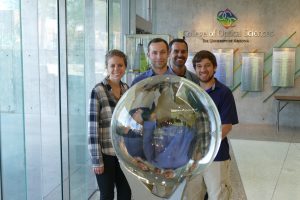Home

Welcome to the Bose-Einstein Condensation (BEC) lab at the University of Arizona’s Wyant College of Optical Sciences. Located in warm and sunny Tucson, we are pursuing research with some of the coldest stuff in the universe: dilute-gas Bose-Einstein Condensates. Our specific areas of interest include studies of superfluid vortices and quantum turbulence. We use BECs held in hybrid magnetic and optical potentials, in both 3-D and nearly 2-D trapping geometries. We gratefully acknowledge funding and support from the National Science Foundation through numerous grants.
What is a BEC?
A dilute-gas Bose–Einstein condensate (BEC) is a state of matter of a dilute gas of bosonic particles (we use 87Rb atoms) cooled to temperatures very close to absolute zero — a few billionths of a degree above absolute zero: 0 K, or −273.15 °C. Under such conditions, a large fraction of the atoms have the lowest possible energy level of the trapping potential, at which point macroscopic quantum phenomena become apparent. Our BECs are microscopic gas droplets of about a million atoms at extremely low density — about a million times less dense then normal air.

